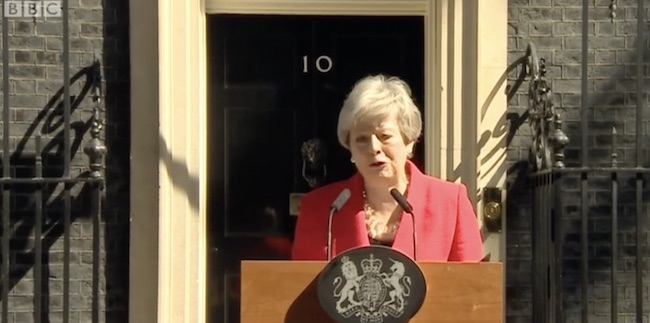Industry experts believe that the resignation of Prime Minister Theresa May today makes a General Election and a new EU Referendum more likely.
They warned that continuing economic and investment uncertainty was also a likely outcome.
Most were expecting the widely predicted exit of Mrs May who announced at Downing Street today that she will quit as Conservative leader on 7 June, paving the way for a new Prime Minister.
An emotional Mrs May said she had done her best to serve “the country I love” but felt it was in the best interests of the country that she step down as EU withdrawal faced deadlock. She will quit as Conservative Party leader on 7 June but remain as caretaker until a new PM is chosen.
Mrs May has been beset by years on in-fighting, political rancour and disagreement as she endeavoured to make the EU Referendum vote to leave the EU a reality.
The FTSE and sterling both rose this morning after the announcement but some feel this may be short-lived.
At investment manager Hermes chief executive Saker Nusseibeh said the uncertainty would not be ended by Mrs May’s exit.
He said: “Sadly, there was an inevitability to this end. We are, however, no nearer to an end of this uncertainty with the fabric of British politics shredded by the emotive debate over the past three years and the balance of negotiating power between the UK and the EU unchanged.
“What is clear is that Westminster has a long hard road ahead of it to restore its reputation with the majority of voters and the country clearly needs leadership that heals its divisions.”
Silvia Dall’Angelo, senior economist at Hermes, said: “Theresa May's premiership has reached the end of the road, following almost three years of trying to recompose a deeply divided country.
“Looking ahead, a new leader is unlikely to bring the country closer to a solution for the Brexit dilemma. For a start, the parliamentary arithmetic would not change: while there is a majority against a no-deal Brexit, there is no agreement on the way forward.”
“The next stage will probably result in early general elections, but other outcomes are possible, including a second referendum and a no-deal Brexit. At any rate, the Brexit situation is unlikely to be resolved any time soon, and uncertainty will persist, which will continue to weigh on the country’s economic prospects and financial assets.”
Adrian Lowcock, head of personal investing at wealth manager Willis Owen, said: “The new Prime Minister will need to convince the EU to re-open negotiations, and if they don’t succeed then they face the same challenge May did – getting a bad deal or no deal through Parliament.
“The possibility of a general election later in the year will rise and markets will need to consider the potential of a Corbyn-led government. So the uncertainty is set to continue for much of this year and during that time international investors are likely to sit on the sidelines and await some clarity.
“For UK investors, patience is critical. While Brexit and political games occupy the news, UK markets are going to remain under pressure; but once these issues are resolved the focus can shift onto the reasonably healthy economy and international investors will return as the valuations of UK equities are currently attractive.”
Tim Graf, head of macro strategy EMEA at State Street Global Markets, said: “Theresa May’s resignation came as no surprise, but the modest support sterling and UK rates have enjoyed since her announcement is somewhat remarkable. We suspect that support will prove temporary.
“Not only do proponents of a no deal Brexit dominate the list of her likely successors, Parliament has almost no options at its disposal to check any future Prime Minister who wants to leave the European Union without a deal.”

